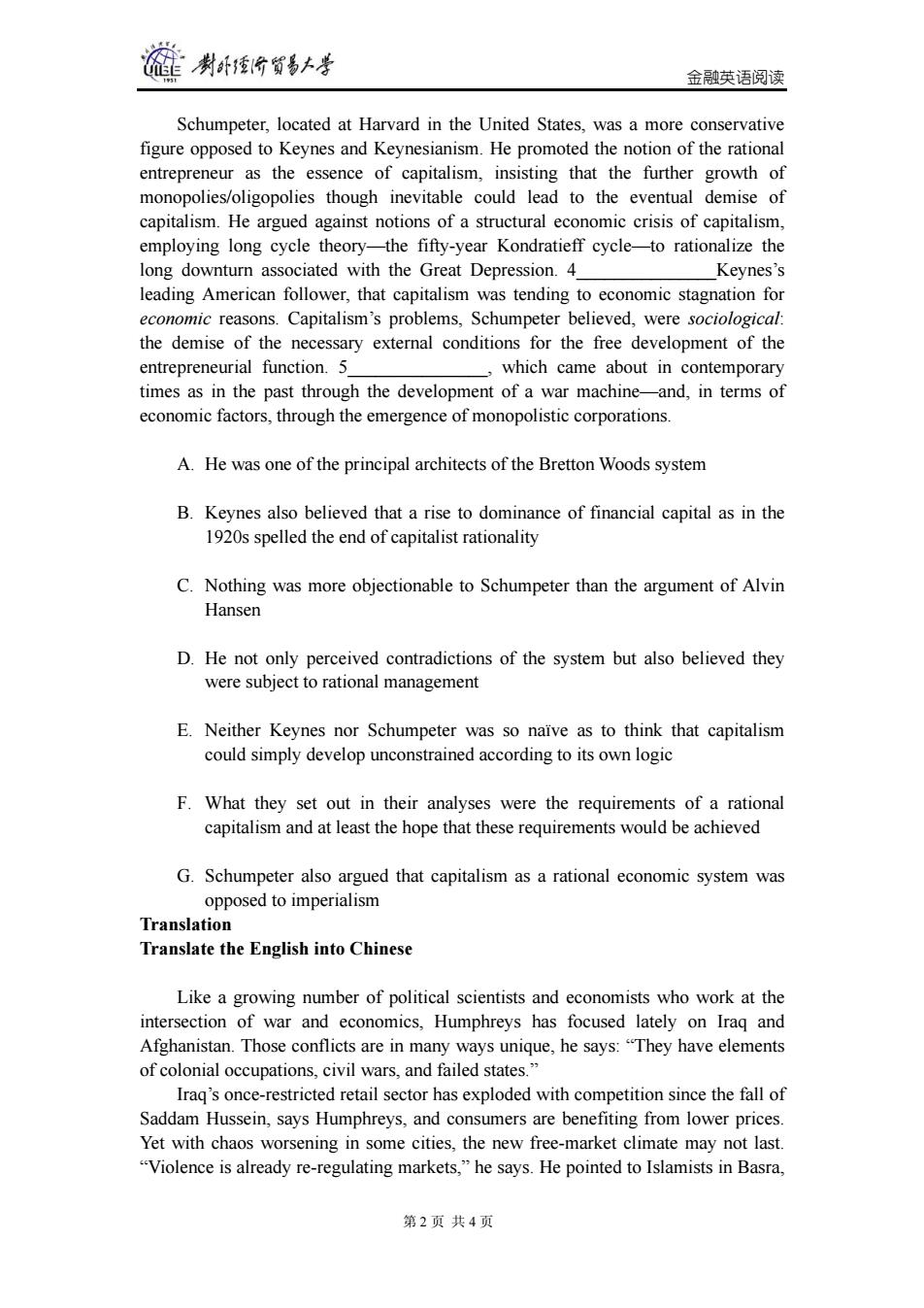正在加载图片...

制卧价贸易上孝 金融英语阅读 Schumpeter,located at Harvard in the United States,was a more conservative figure opposed to Keynes and Keynesianism.He promoted the notion of the rational entrepreneur as the essence of capitalism,insisting that the further growth of monopolies/oligopolies though inevitable could lead to the eventual demise of capitalism.He argued against notions of a structural economic crisis of capitalism, employing long cycle theory-the fifty-year Kondratieff cycle-to rationalize the long downturn associated with the Great Depression.4 Keynes's leading American follower,that capitalism was tending to economic stagnation for economic reasons.Capitalism's problems,Schumpeter believed,were sociological: the demise of the necessary external conditions for the free development of the entrepreneurial function.5 which came about in contemporary times as in the past through the development of a war machine-and,in terms of economic factors,through the emergence of monopolistic corporations. A.He was one of the principal architects of the Bretton Woods system B.Keynes also believed that a rise to dominance of financial capital as in the 1920s spelled the end of capitalist rationality C.Nothing was more objectionable to Schumpeter than the argument of Alvin Hansen D.He not only perceived contradictions of the system but also believed they were subject to rational management E.Neither Keynes nor Schumpeter was so naive as to think that capitalism could simply develop unconstrained according to its own logic F.What they set out in their analyses were the requirements of a rational capitalism and at least the hope that these requirements would be achieved G.Schumpeter also argued that capitalism as a rational economic system was opposed to imperialism Translation Translate the English into Chinese Like a growing number of political scientists and economists who work at the intersection of war and economics,Humphreys has focused lately on Iraq and Afghanistan.Those conflicts are in many ways unique,he says:"They have elements of colonial occupations,civil wars,and failed states." Iraq's once-restricted retail sector has exploded with competition since the fall of Saddam Hussein,says Humphreys,and consumers are benefiting from lower prices. Yet with chaos worsening in some cities,the new free-market climate may not last "Violence is already re-regulating markets,"he says.He pointed to Islamists in Basra, 第2页共4页金融英语阅读 第 2 页 共 4 页 Schumpeter, located at Harvard in the United States, was a more conservative figure opposed to Keynes and Keynesianism. He promoted the notion of the rational entrepreneur as the essence of capitalism, insisting that the further growth of monopolies/oligopolies though inevitable could lead to the eventual demise of capitalism. He argued against notions of a structural economic crisis of capitalism, employing long cycle theory—the fifty-year Kondratieff cycle—to rationalize the long downturn associated with the Great Depression. 4_______________Keynes’s leading American follower, that capitalism was tending to economic stagnation for economic reasons. Capitalism’s problems, Schumpeter believed, were sociological: the demise of the necessary external conditions for the free development of the entrepreneurial function. 5_______________, which came about in contemporary times as in the past through the development of a war machine—and, in terms of economic factors, through the emergence of monopolistic corporations. A. He was one of the principal architects of the Bretton Woods system B. Keynes also believed that a rise to dominance of financial capital as in the 1920s spelled the end of capitalist rationality C. Nothing was more objectionable to Schumpeter than the argument of Alvin Hansen D. He not only perceived contradictions of the system but also believed they were subject to rational management E. Neither Keynes nor Schumpeter was so naïve as to think that capitalism could simply develop unconstrained according to its own logic F. What they set out in their analyses were the requirements of a rational capitalism and at least the hope that these requirements would be achieved G. Schumpeter also argued that capitalism as a rational economic system was opposed to imperialism Translation Translate the English into Chinese Like a growing number of political scientists and economists who work at the intersection of war and economics, Humphreys has focused lately on Iraq and Afghanistan. Those conflicts are in many ways unique, he says: “They have elements of colonial occupations, civil wars, and failed states.” Iraq’s once-restricted retail sector has exploded with competition since the fall of Saddam Hussein, says Humphreys, and consumers are benefiting from lower prices. Yet with chaos worsening in some cities, the new free-market climate may not last. “Violence is already re-regulating markets,” he says. He pointed to Islamists in Basra